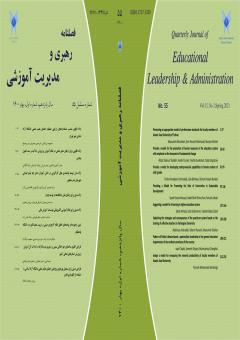Mechanisms of socialization of faculty members of Islamic Azad University
Subject Areas :
maryam Hafezy
1
,
Mahmood Rezaeezadeh
2
,
ناصر میرسپاسی
3
![]()
1 -
2 -
3 -
Keywords: Mechanisms of socialization, faculty members, Islamic Azad University.,
Abstract :
Purpose: Paying attention to indigenous models in achieving organizational goals can transform the situation in favor of the organization. The present study was conducted with the aim of identifying the components and indicators of socialization mechanisms of the faculty members of Islamic Azad University.
Method: The research method of this study was qualitative and based on thematic analysis. Data were collected through 12 semi-structured in-depth interviews with experts and experienced university professors, selected using purposive sampling. Data were gathered using an emergent design and analyzed thematically using Braun and Clarke and Sterling's coding approach.
Findings: The results led to the identification of socialization mechanisms with six main categories: reward and compensation, feedback, formal training, informal methods, integration and involvement in academic activities, and performance management; and 19 sub-categories.
Conclusion: The results of this study showed that the reward and compensation component is prioritized, and Islamic Azad University should pay special attention to the financial compliance of its faculty members. Performance feedback will be effective only when provided fairly. Holding training courses and meetings enhances cooperation and motivation. Family gatherings and welfare facilities, while reducing individual and organizational conflicts, increase opportunities for interaction, empathy, and learning. Participation in university councils and events is a valuable opportunity for personal and professional development. Attention to performance management can create a dynamic and efficient environment for faculty members.
بهشتی فر، ملیکه و نکویی مقدم، محمود. (1389). رابطه رفتار اخلاقی مدیران با رضایت شغلی کارکنان، اخلاق در علم و فناوری، سال 5 (1): 67-73.
رشتیانی، سهراب و رحیمیان، حمید و عباسپور، عباس (1397). رابطه جامعهپذیری دانشگاهی و مشارکت اجتماعی در بین دانشجویان جوان دانشگاه تهران. مطالعات راهبردی ورزش و جوانان. 17: 39.
سلیمانی قراچلو، ذبیح الله؛ حسینی، سید کمال الدین.( 1402). بررسی رویکردهای جامعه پذیری با تاکید بر رویکرد درونی سازی در فرایند آموزشی. همایش پژوهش های مدیریت و علوم انسانی در ایران. مجموعه مقالات پانزدهمین کنفرانس بین المللی پژوهش های مدیریت و علوم انسانی در ایران.
شیربیگی، ناصر و قادرزاده، امید و تمسکی، مریم (1394). درک و تجربه اعضای هیئت علمی از فرایند آشناسازی بدو استخدام و روزهای اول کار، پژوهش های مدیریت منابع انسانی دانشگاه جامع امام حسین (ع)، 7(2): 179-207.
محدث خالص، سید محمد رضا، و مختاری، مهران، و آقااحمدی، قربانعلی؛ و کیاکجوری، داوود. 1401. شناسایی و اولویت بندی تاکتیک های جامعه پذیری نهادی در سازمان های دولتی. فصلنامه مدیریت توسعه و تحول. 51: 63-80.
منصوری، علی نظر، و یزد خواستی، بهجت. (1400). تحلیلی بر عوامل موثر بر جامعهپذیری دانشگاهی دانشجویان. مطالعه موردی، دانشجویان تحصیلات تکمیلی دانشگاههای تهران، تربیت مدرس، شهید بهشتی، شیراز و فردوسی. مجله راهبرد فرهنگ. 18 (2): 123-101.
Austin, A. E., Sorcinelli, M. D., &, & McDaniels, D. (2007). Understanding new faculty: Background, aspirations, challenges, and growth. In R. P. Perry, & J. C. Smart (Eds.), The scholarship of teaching and learning in higher education: An evidencebased perspective. 12: 39‐89.
Bauer, Talya. Niehaus & Morrison, Elizabeth, Wolfe & Callister, Ronda Roberts (1998). Organizational socialization of research in personnel management and human resources, 16: 128-155.
Batistič, S. (2018). "Looking beyond-socialization tactics: The role of human resource systems in the socialization process", Human Resource Management Review, 28(2): 220–233.
Bugler, Ronit & Kramer-Havon, Lya (1999). Socialization of faculty members with the culture and norms of the university, Journal of Complementary and Higher Education, 1(23): 31-40.
Bowen, Howard & Schuster, Jack (1986). American Professors. A national resource at risk. New York, Oxford University Press. 1: 84-87.
Bowman, T. G., Klossner, J. C., & Mazerolle, S. M. (2017). The Doctor of philosophy experience of athletic trainers: Facilitators and barriers to anticipatory faculty socialization. Journal of Athletic Training, 52(10): 925-936.
Beheshtifar, Malakeh & Nekui Moghadam, Mahmood (1389). The relationship between manager's ethical behavior and employees' job satisfaction, ethics in science and technology. 67-73.
Bich, Ngoc & Nguyen Hoang. (2022). Examining the socialization of new faculty members through the cultural lens. Social Sciences, 12: 18-31.
Chao, georjia (1997). Unstructured training and development: The role of organizational socialization. Improving the effectiveness of training in work organizations. 129-151.
Crow, Gary & Glascock, Catherine (1995). Socialization to a new concept of management, Journal of Educational Management, 33: 22-43.
Delaney, J. T., & Huselid, M. A. (1996). The impact of human resource management practices on perceptions of organizational performance. Academy of Management Journal, 39(4), 949-969.
Dunn, D., Rouse, L. & Seff, M.A. (1994). ‘New faculty socialization in the academic workplace’, in Smart, J.C. (ed.), Higher Education: Theory and Research, Volume 10. New York: Agathon. 374-416.
Gibbs, G., & Coffey, M. (2004). The impact of training of university teachers on their teaching skills, their approach to teaching and the approach to learning of their students. Active Learning in Higher Education, 5(1), 87-100.
Hall, D.T. (2004) The Protean Career: A Quarter-Century Journey. Journal of Vocational Behavior, 65, 1-13.
Kondakçı, Yasar & Haser, Çigdem (2019). Socialization in the university: a qualitative study of the role of contextual dynamics in the socialization of academics. Research in educational management and leadership, 2(4): 272-301.
Liao, Junyune; & Huang, Minxue; & Xiao, Bangming (2017). Promoting continuous member participation in company-hosted online brand communities: An organizational socialization approach. Journal of Business Research, 71: 92-101.
Shirbigi, Naser & Ghaderzadeh, omid & Temski, Maryam (2014). Faculty members' understanding and experience of the familiarization process before hiring and the first days of work, human resource management researches of Imam Hossein University (AS), 7(2):179-207.
Storm, Anderson & Baaska, Anderson (2012). Preparation and socialization of education professors: Narratives of doctoral students and teachers. International Journal of Teaching and Learning in Higher Education, 2(24): 239-251.
Tierney, william & Rhodes, Robert (1997). Increasing promotion, tenure, and beyond: Faculty socialization as a cultural process. Higher education report. 6: 48.
Weidman, John & Twale, Darla (2001). Socialization of graduate and professional students in higher education: a dangerous transition? Higher education report. 28 (2): 107-119.


